When you purchase an item after clicking a link from this post, we may earn a commission.
Devin: What is your superpower?
Tania: The thing that I hear most often from people in terms of a thing that they have found to be helpful about working with me is that my focus when interacting with anyone is how I can help them be more effective at whatever it is they want to be more effective at. I tend to look at every interaction through the lens of how I can help this individual or this group be even better as a result of us having collided together in time and space. So it’s almost like every interaction is my opportunity to make the place better than I found it.
Tania Luna, co-founder and chair of LifeLabs Learning and co-author of The Leader Lab, Core Skills to Become a Great Manager Faster, says there is a “relatively small number of skills” that people need to lead and collaborate more effectively.
With thousands of corporate clients and about 350,000 people her company has trained in leadership skills, she speaks as one we should listen to.
“Our goal with all of the training that we do is to give people just the core skills, not all the skills, the most important skills they need to be able to collaborate more effectively, to be able to achieve amazing things together that they couldn’t achieve on their own,” Tania says.
Tania rattles off a list of the top priority core skills—she sharply rejects the label “soft skills—for leaders that she considers “tipping point” skills because they influence so many domains.
Coaching skills
Feedback skills
Prioritization
Leading effective one-on-ones
Strategic thinking
Leading meetings
Effectively leading change
Helping people develop skills
She admits that it was surprising that coaching skills would rise to the top of the list. She describes it as “being able to ask high-quality questions so that you can help people develop their own capacity to solve problems and to have insights.”
As chair of LifeLabs Learning, Tania has time to pursue her passions. She and her husband live with 21 rescued animals, emblems of her animal advocacy. She established a nonprofit, Scarlet Spark, to apply the leadership lessons from LifeLabs Learning to organizations that help animals.
“At this point in my life, what I wanted to do was be able to help non-humans as well and focus on animals,” Tania says. “Where I landed was being that spark for animal advocacy organizations so that they are able to achieve their missions faster as a result of having great leadership skills.”
Tania observed a common fallacy among nonprofits. “Nonprofits, whatever their focus is, assume that they can keep people engaged and motivated just through the power of the purpose and the mission.”
The idea is pervasive. “Our clients who are for-profits are like, ‘oh, if only we were a nonprofit, then people would really care about their work,’” she says.
“Unfortunately, that’s not enough,” Tania says. “Oftentimes, it almost makes you feel kind of trapped because you care so much about the mission, but you have a terrible experience at work.”
Her goal is to help people feel more wholly engaged. “It’s so much more joyful to have a workplace experience where you feel at your best.”
In purpose-driven organizations especially, there is a tendency to believe another tempting illusion. “One of the big misconceptions around how to get to that place where people are collaborating effectively, giving feedback, all that kind of stuff, is that ‘we’ll figure it out as we go along,’” Tania says.
It’s more complicated than it seems. “Unfortunately, it’s hard to learn from experience,” she says. “We don’t know which thing we did last month resulted in someone quitting today.”
“As a society, it seems we’ve bought into this idea that being good at interacting with people is important,” Tania says. “But we haven’t quite recognized the diligence that it takes.”
Good management and interpersonal skills don’t come naturally to most people. As diversity in the workplace increases—especially in the age of working at a distance from colleagues—deliberate effort is required.
In Tania’s efforts to make the world better, she has leveraged her superpower, a focus on helping others become better.
How to Develop a Focus on Helping Others As a Superpower
Tania’s focus on helping others isn’t a generalized notion about making the world a better place or helping humanity. Instead, her focus is often on the person in front of her. She shared an example that demonstrates how her superpower has worked:
Just this morning I was talking to a coworker of mine who has been at life labs learning for about seven years now. Back when I was teaching psychology at a university, she was a student of mine, and LifeLabs was—she likes to call it her first big girl job—and we were just talking about like, “What do you want to be doing at LifeLabs? Do you even want to be exploring opportunities elsewhere?”
And she was like, “Man, I could do a lot of things. Now I've learned so much. I've become this stronger, better person as a result of this experience.”
She was this very shy person in many ways, very insecure. Now she's bold and confident and powerful, just incredibly powerful. To see that I played some small part in being a catalyst for that power. Yeah, that feels really exciting.
If we’ve learned anything from Tania so far, we appreciate that developing and employing a focus on helping others isn’t something that will just happen. We have to cultivate it deliberately. She offered some insights to help us do that.
First, Tania offers that we need to learn to ask the right questions in the right way as part of the coaching skill set taught by LifeLabs. “Are you asking questions that inform you, or are you asking questions that enlarge the individual’s way of thinking or seeing the world or seeing themselves?”
Digging a bit deeper, Tania reflects on the importance of values. To make her point, she shared her personal experiences as a child:
In fourth grade. I, for some reason, campaigned to be the vice president of the student council. In the fifth grade, I was the president of the student council. In third grade, I started the Power Girls Club because the boys had a Power Rangers club and they didn't allow girls.
I was very bad at all the things, but I still had this conviction that my purpose is to make things better for others. Because that is a conviction, it makes it much easier to learn to figure out how to do that.
Believe it or not, Tania adopted or discovered core values even earlier.
Since I was, I think it was like two-and-a-half or three years old, when I realized I was going to die—I remember the moment and I was like, ‘Oh, life is short.’ I think that comes with many drawbacks. It's created probably a sense of urgency within my life that has some negative side effects, too.
But on the positive side, I always thought, so many people talk about having regrets in life. Since I was a little kid, I was like, ‘I can have regrets in terms of bad decisions I've made, but I will not allow myself to have regrets in terms of not having done enough to try to help, to try to make an impact.’
So that sense of recognizing that time is limited, and this is my chance to do something good, to do something meaningful that ultimately drives the skill building.
As we discussed the implications of these stories, she agreed that she holds two closely related values. First, she believes that she can make a difference for others; second, she believes that she gets to.
She notes that she doesn’t feel an obligation to help. It’s not about “should.”
“There’s something about the should that feels like I’m being a bad person if I’m not helping,” Tania says. “I think that’s very taxing and very heavy and can lead to a lot of compassion fatigue.”
“But I try to think of it as like, ‘I get this many years to do some really cool stuff and make people’s lives better, animals’ lives better.’ I think that drives a more kind of uplifting feeling.”
“It’s no one’s responsibility to be helping. But we get to. It’s so amazing for us selfishly to see the impact and the ripple effects that it could have on the world,” she concludes.
You can make a focus on helping others a superpower that enables you to have more impact by following Tania’s example and advice.

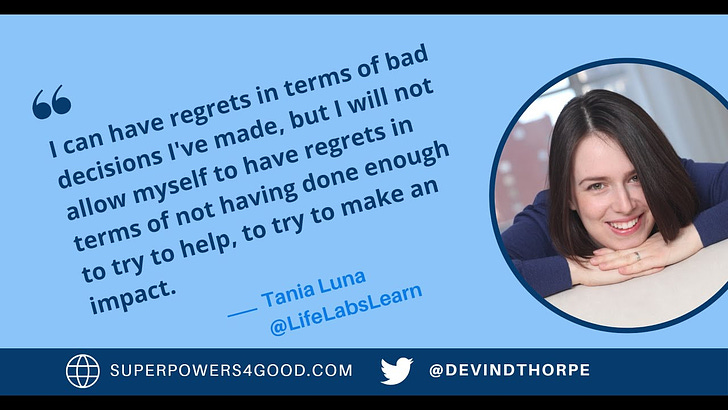



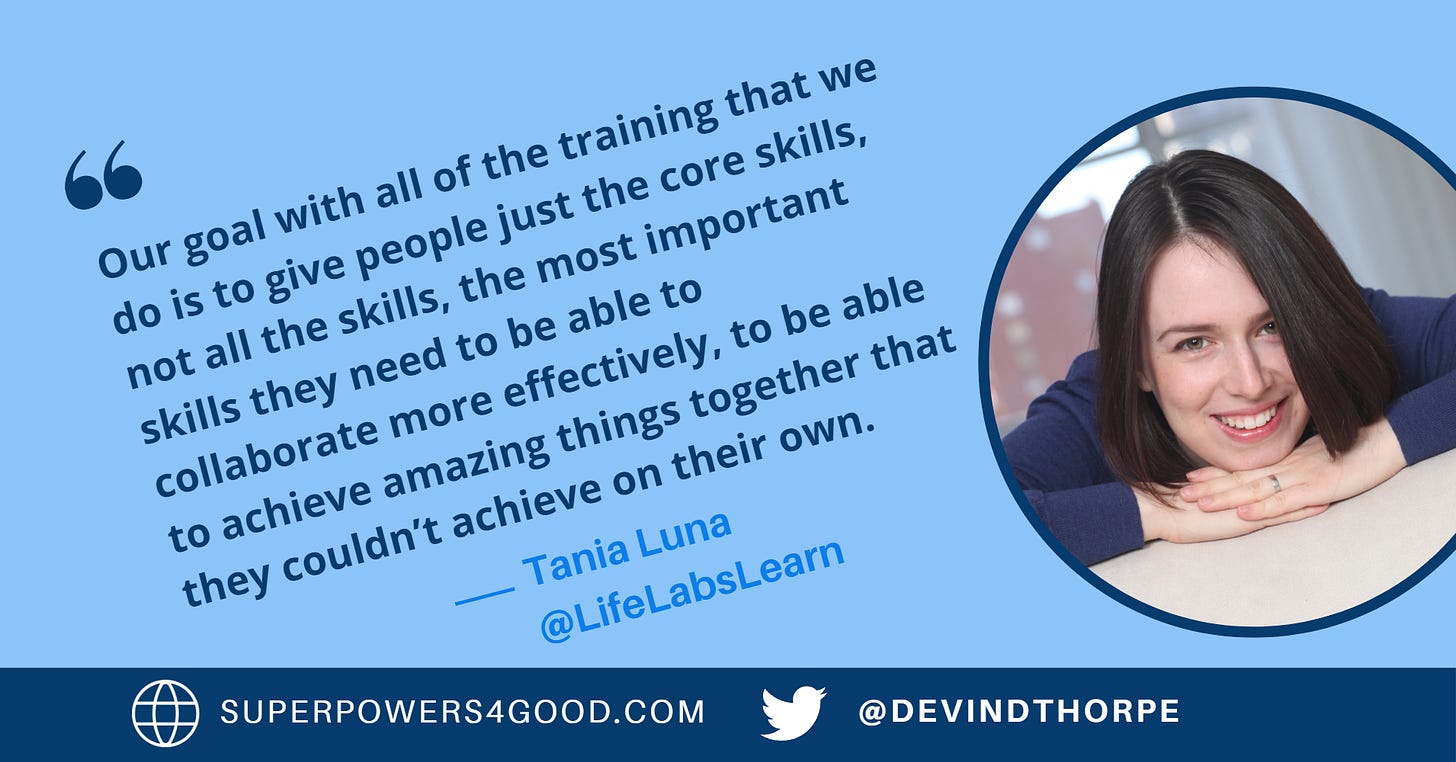
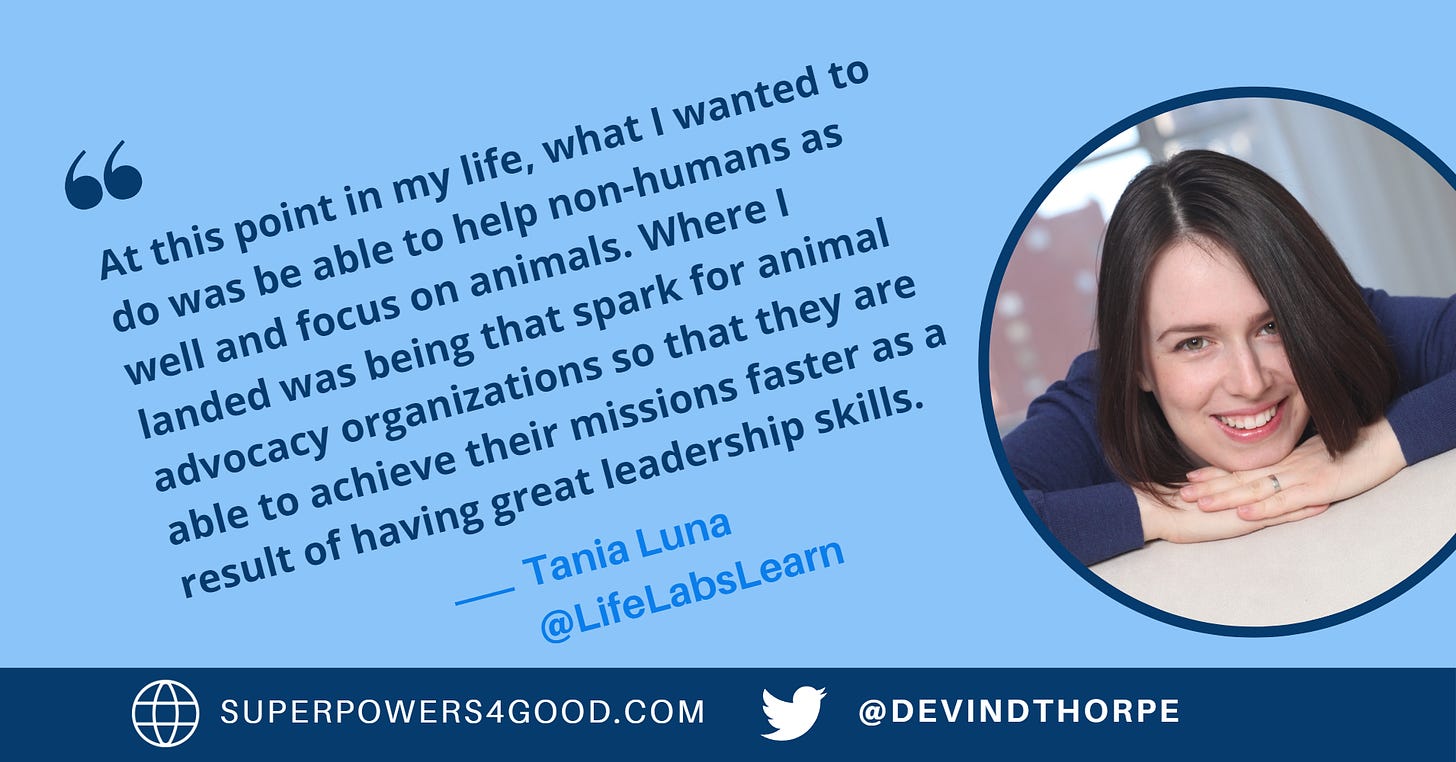
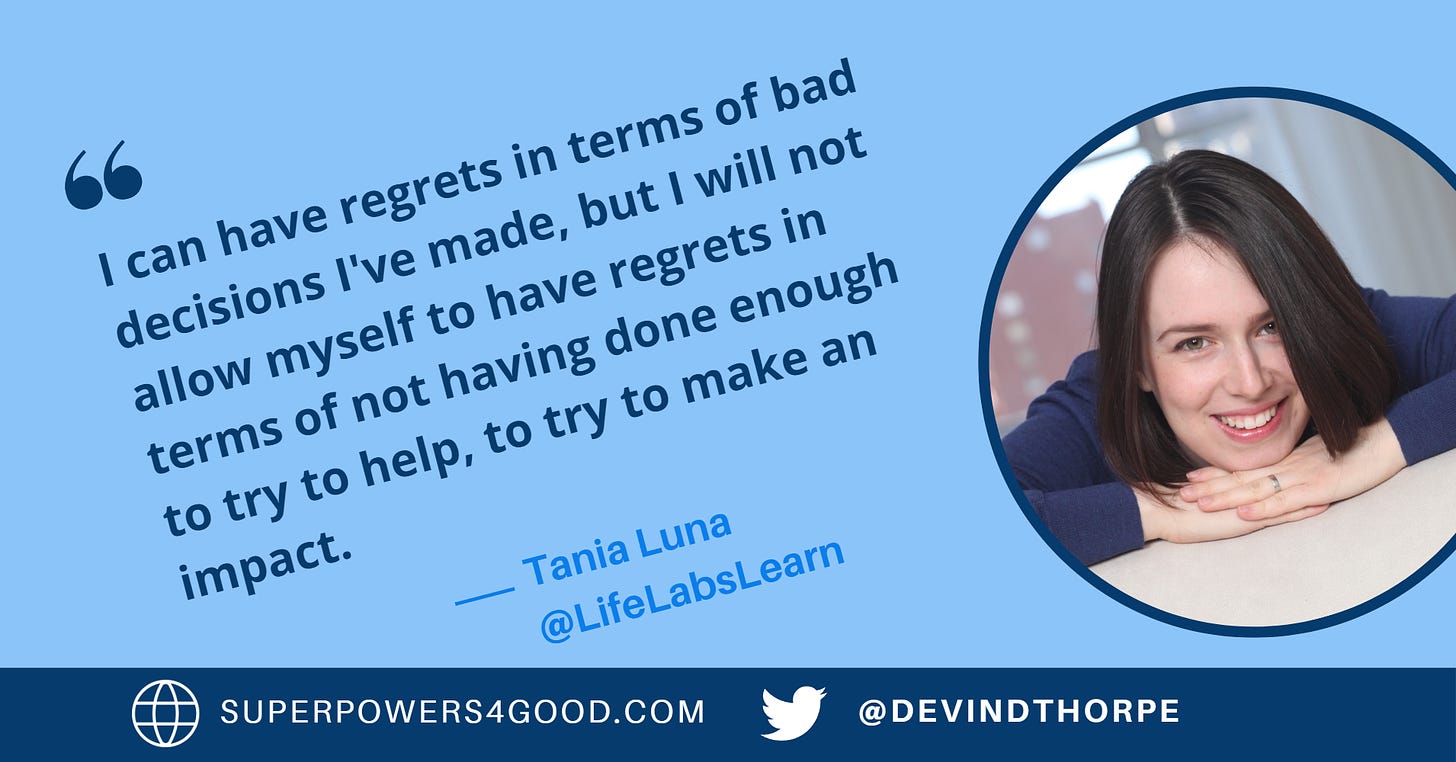




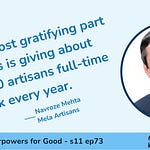











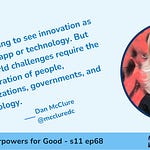


7 Core Skills for Changemakers